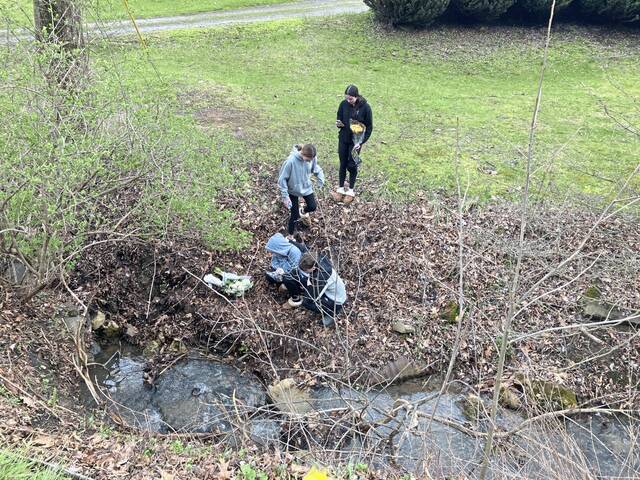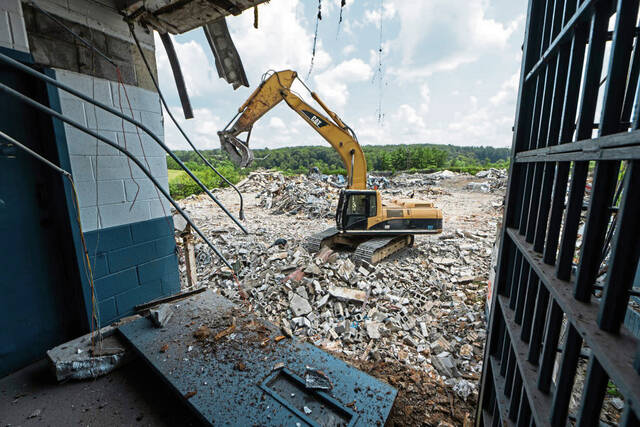Communities accustomed to receiving large checks from Marcellus Shale wells through the state’s natural gas impact fee will get less money this year because gas prices have fallen and fewer wells are being drilled, according to the state.
The state Public Utility Commission will hand out $100 million less next month to state agencies, counties and local municipalities from the Act 13 gas well impact fee this year — $179.6 million — because of a drop in new wells drilled and lower natural gas prices in 2023 compared with 2022, the state said. The state has distributed some $2.7 billion since 2012, when the impact fee distribution was in place.
“Act 13 has been a godsend for the road repairs, for the tar and chipping” of township-owned roads, Frazer Township Manager Lori Ziencik said.
“We’ve spent almost three-quarters of a million dollars (in impact fee money) since 2012. It’s the only way we can do major road repairs,” said Ziencik, noting the municipality only gets about $60,000 from the state’s allocation of liquid fuels money for roads and bridges.
Frazer will get $109,289 in gas well impact fee money from the gas well production of 2023, about $63,000 less than the allocation from 2022.
Frazer is like a lot of other municipalities that use the gas well impact fee revenue for road repairs, while others also use it for maintenance, emergency services, stormwater projects, big-ticket purchases and more.
“Every little bit helps. It helps the taxpayer,” said Mark Petros, chairman of the Sewickley Township supervisors. The township will get $92,966 from the 2023 gas well production, about $65,000 less than last year.
Sewickley Township uses the money for road repairs and purchases of anti-skid and salt for winter maintenance, Petros said.
The impact fee revenue flowing to state and local governments comes from a levy on all gas producers with spud wells in Pennsylvania. Producers pay an impact fee determined by a multi-year fee schedule based on the average price of natural gas. Natural gas prices fell in 2023 to $2.74 per metric million Btu compared with $6.64 metric million Btu in 2022, the PUC said. Not only that, the state saw fewer new wells in 2023 — 423 — compared with the 574 drilled in 2022.
The distribution of the revenue from the gas well impact fee to the townships and other municipalities, and not just state government, is significant, said David Sanko, executive director of the Pennsylvania Association of Township Supervisors.
“It’s made a huge impact that is being felt in the communities. It is going to the places that are dealing with the impact of the drilling” on infrastructure such as roads and bridges, Sanko said.
Just as importantly, “it helps to cover expenses without raising taxes,” Sanko said.
Counties and municipalities where drilling occurs receive more to compensate for the wear and tear on roads and infrastructure used by trucks involved in the operations.
In the case of Sewickley Township, there are 28 gas wells on which the impact fee is collected and another 37 wells in which producers are exempt from paying the fee that helps repair damage from the trucks that take their toll on municipal roads. When in the midst of production, gas well drilling may occur 24 hours a day and water-hauling trucks, needed to fracture the shale to release the methane, are driving back and forth on local roads.
While surrounding municipalities get smaller amounts from the gas well impact fee, Ziencik said there is a price to pay for all of that gas well activity in Frazer.
“Our residents are really putting up with the aggravation” of having those operations within the municipality, Ziencik said.
Westmoreland revenue
Derry Township received more money from the gas well impact fee — $179,370 — than any other municipality in the county, despite a drop of about $123,000 from its 2022 allocation. The township uses the money to buy equipment and for road repairs, Supervisor Don Kepple said. The township had 53 wells last year, the second-highest number of any municipality in the county, according to the PUC.
Washington Township, which will get $170,071, will put the money in the capital improvement fund for road repairs, said Joseph Olszewski, township supervisor.
The township had 55 well whose production contributed to the impact fee allocation, more wells than any other municipality in the county, according to the PUC.
Hempfield will use the $161,961 it will receive for emergency services for the fire department as well as repairs and equipment, said Aaron Siko, township manager.
The township used the money from the 2022 allocation — about $61,000 more than it will get for 2023 — generated from 33 wells, for an exhaust fan at the North Hempfield fire station and for a fire truck, Siko said.
Hempfield was anticipating a drop in the gas well impact fee after discussions with state officials, Siko said.
In Bell Township, the municipality will get about $62,850, a decrease from $82,420, for the impact of the 20 wells drilled in the township.
Penn Township is set to receive $96,759 from the gas well impact fee, a drop of about $40,000 from the 2022 allocation.
Penn Township is home to 23 natural gas wells and to the environmental organization Protect PT, which has opposed natural gas drilling in the municipality.
Allegheny Township will receive $31,960 from the impact fee of the six wells drilled in the township, a drop from $52,420 it received from the 2022 allocation.
Westmoreland County will get about $1.1 million from this year’s distribution, about $72,000 less than last year. The county has 304 of the state’s 11,829 unconventional wells on which the impact fee was levied in 2023, according to PUC data.
Commissioner Sean Kertes said about $800,000 will be used to support the Public Safety department’s 911 operations, including the communication towers and others facilities.
Allegheny County, where there are 185 unconventional wells, will receive $1.4 million from the gas well impact fee from 2023, down from $2.29 million from the 2022 impact fee.
The county splits the money from the gas well impact fee between emergency services and the parks department, said Abigail Gardner, an Allegheny County spokeswoman. It is assigned as general revenue in those departments, Gardner said.
“Act 13 has been the best piece of legislation. The money goes directly to the municipalities,” Ziencik said.








